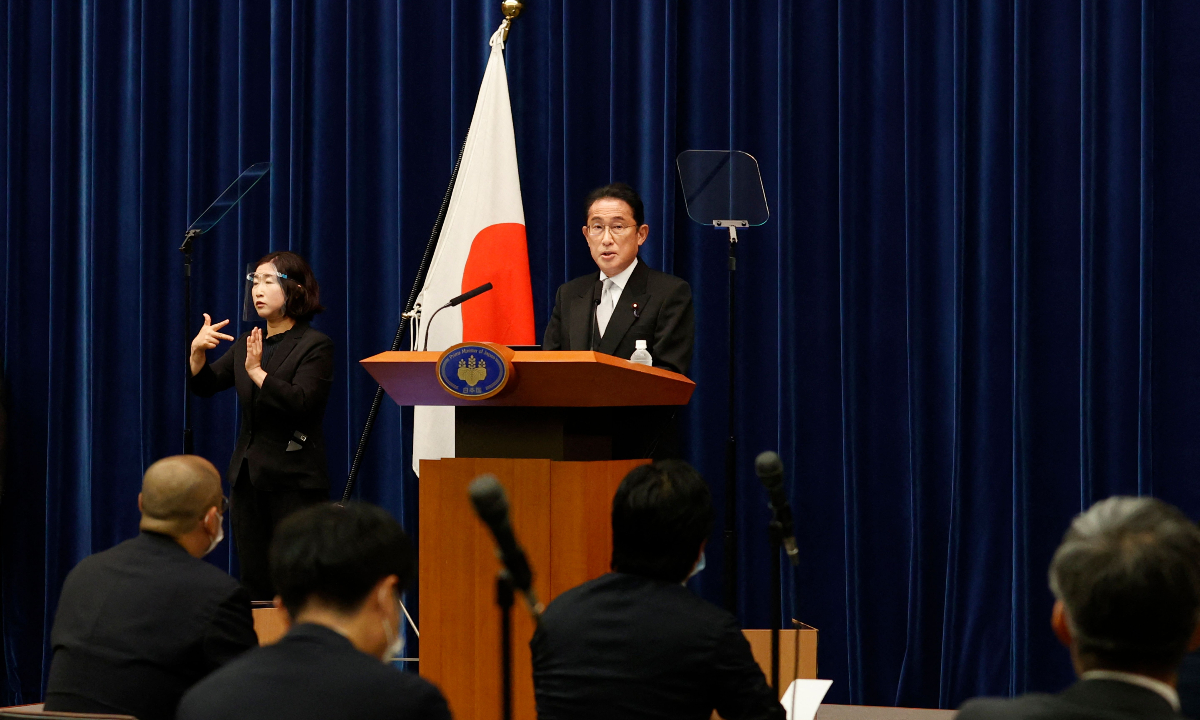
Japanese Prime Minister Fumio Kishida speaks during a press conference at the prime minister's official residence in Tokyo on August 10, 2022. Kishida reshuffled his cabinet after a slump in approval ratings. Photo: VCG
Seeking to form a stable administration amid the "biggest challenges of the postwar era," including the pandemic, inflation, souring ties with China and controversy over politicians' links to a cult,
Japanese Prime Minister Fumio Kishida announced a reshuffle of his cabinet and top officials of the ruling Liberal Democratic Party (LDP) on Wednesday for the first time in his tenure.
Given that former Japanese prime minister Shinzo Abe's assassination, which has been linked to the Unification Church, is one of the major reasons triggering the reshuffle, the real threat to Japan is not from China, but from within Japan, observers said.
Judging from this reshuffle, the country's policy on the Taiwan question is likely to be continued, and the challenges in its relations with China still outweigh the opportunities, observers warned.
Key figures like Foreign Minister Yoshimasa Hayashi and Chief Cabinet Secretary Hirokazu Matsuno held onto their posts, however some high-profile ministers were removed, media reported.
Two appointments have drawn wide attention from Chinese observers. According to the Japan Times, onetime Defense Minister Yasukazu Hamada has again taken over that post, reprising a role he filled from 2008 to 2009, while the position of economic security minister has been handed to former LDP policy chief Sanae Takaichi, a disciple of Abe and a former rival to Kishida for the party presidency. Known as being a hawk on military matters and particularly tough on China-related issues, Takaichi was Abe's pick for the LDP top job, the report said.
With highlighted tensions in the Taiwan Straits, Kishida's decision to reappoint "old hand" Hamada as defense minister was apparently made after many considerations. For example, whether the person has experience in dealing with Japan's security environment, specifically in case of an emergency occurring in the Taiwan Straits, John Lim Chuan-tiong, an expert from the island of Taiwan who is chief of the Japan Research Center, Wuhan University, told the Global Times on Wednesday.
There is
a growing dangerous perception within the Japanese government that "a Taiwan emergency is an emergency for Japan," observers warned.
If "Taiwan independence" forces continue to grow and Japan insists on involving itself in conflicts across the Straits, in the end, Japan will have to pay high security costs, and it will be impossible to achieve sustainable security, warned Liu Jiangyong, vice dean of the Institute of Modern International Relations at Tsinghua University.
As a high-level Japanese group that included Hamada visited the island of Taiwan on July 28, there is an analysis that appointing Hamada as defense minister showed the importance Japan places on relations with the Taiwan region. But Lim believes that "this is a big misunderstanding," as Hamada was not a radical, conservative politician, but not "pro-China" either. Hamada has rarely made remarks in public that have provoked China, Lim noted.
The expert continued that this reflects that Kishida did not want to choose anyone who would provoke China more. The current policy of the Kishida administration is a comprehensive tilt toward the US, but it does not mean that it wants to fall out with China amid tensions in ties with China, Lim said.
Considering that Japan plans to release three documents on national defense which aims to point fingers on the Taiwan question and boost defense spending, it remains to be seen whether Hamada can continue to be moderate, Lim noted.
Hamada takes the reins from Nobuo Kishi, who is said to be departing due to health considerations, Japan Times reported. Kishi, the younger brother of Abe, was one of the backbones of "pro-Taiwan Independence" forces in Japan, and has taken a hard line on China, Liu said. The expert revealed that the real reason for this removal is that Kishi was linked with the Unification Church.
Kishida's reshuffled cabinet has slashed the number of members with ties to the cult from eight to three, Asahi Shimbun reported.
Takaichi who was appointed economic security minister can reassure right-wing conservative forces, help reduce the backlash from Abe's loyalists and woo US support, Liu believes.
The reshuffle as a whole shows that Kishida opted for experience and stability, as well as a balance between internal bloc politics of the conservative LDP during his administration, observers said.
This reshuffle has basically ended the pattern that the backbone power of the Japanese ruling party is wielded by the Abe faction and the faction of the Vice President of the Liberal Democratic Party Taro Aso, that has lasted for many years, Liu said, noting that the new cabinet will be in a transitional stage, and it remains to be seen whether the power will be dominated by Kishida in the future.
The reshuffle came after sagging approval ratings, surging tensions with China and controversy over lawmakers' links to the Unification Church, which Kishida described as "biggest challenges of the postwar era." But the challenges will not easily ebb away through the reshuffle, observers believe.
The decades-long collusion between cults and politics in Japan is a cancer of capitalism, a canker of politics, and exposes that the so-called democratic system is deeply flawed and does not reflect Japanese public opinion, Liu said. This suggests that the real threat to Japan is not from China, but within Japan, Liu said.
Amid tensions in the Taiwan Straits after US House Speaker Nancy Pelosi's provocative visit to Taiwan island, Japan has not only failed to maintain regional stability, but instead issued erroneous statements on the Taiwan question. At present, the challenges in China-Japan relations outweigh the opportunities and have become more severe, Liu pointed out.




